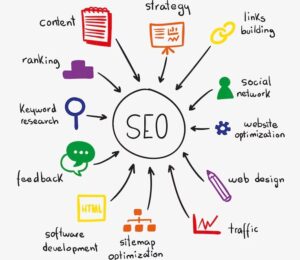As a startup, your online visibility is vital for attracting potential customers and establishing your brand. A well-structured SEO strategy for startups can significantly improve your website’s ranking on search engines, leading to increased organic traffic and, ultimately, more conversions.
For any company, SEO is challenging, but as a startup, you face a difficult task. Before those limited funds run out, you need to start having an impact, get things moving, and start gaining traction. It is probably why many startups use SEO tactics in haste to save time and climb the search rankings ladder and get banned from Google algorithm.
In this article, we will cover the top SEO strategies startups can implement to achieve success in their online ventures.
List of the Best SEO Strategy for Startups:
Understanding Your Target Audience
Before diving into SEO strategies, it’s essential to understand your target audience. Identify their needs, preferences, and pain points to create content that resonates with them. Conducting surveys, analyzing data, and monitoring social media can help gather valuable insights.
Conducting Thorough Keyword Research
Keyword research is the foundation of an effective SEO strategy. Utilize tools like Google Keyword Planner, SEMrush, or Ahrefs to find relevant keywords with decent search volumes and low competition.
Building an SEO-friendly Website
Ensure that your website is well-structured and user-friendly. Optimize the site’s architecture, create descriptive URLs, and include a navigation menu for easy access to various pages.
Creating High-Quality and Engaging Content
Content remains king in the digital world. So we should use the power of content marketing to optimize the content. Develop informative, engaging, and shareable content that adds value to our audience’s lives. Focus on long-form content that covers topics comprehensively.
Leveraging the Power of Backlinks
Backlinks are crucial for SEO success. Focus on acquiring high-quality backlinks from authoritative websites within your niche. Guest posting and outreach campaigns can help in this regard.
Mobile Optimization for User-Friendly Experience
With the majority of internet users accessing content on mobile devices, mobile optimization is paramount. Ensure that your website is mobile-friendly and loads quickly on smartphones and tablets.
Harnessing the Potential of Local SEO
For startups targeting local customers, optimizing for local SEO is essential. Claim and optimize your Google My Business listing, create location-specific content, and encourage customer reviews.
Measuring and Analyzing SEO Performance
Regularly monitor and analyze your SEO performance using tools like Google Analytics and Google Search Console. Track key metrics such as organic traffic, bounce rate, and conversion rate.
Implementing Voice Search Optimization
As voice search gains popularity, optimize your content for voice queries. Use natural language and conversational tone in your content to cater to voice search queries effectively.
Structuring URL and Site Navigation
Keep your URL structure simple and descriptive. Ensure that your site navigation is intuitive and user-friendly, allowing visitors to find what they need effortlessly.
Implementing Schema Markup for Rich Snippets
Schema markup helps search engines understand your content better, leading to rich snippets in search results. Utilize schema markup to enhance your SERP appearance and improve click-through rates. Use Schema org to validate your schemas.
Focus on User Experience and Site Speed
User experience and site speed directly impact your SEO rankings. Optimize your website’s design for seamless navigation and ensure quick loading times for a positive user experience.
Leveraging Google My Business
Claim and optimize your Google My Business listing to appear in local search results and Google Maps. Provide accurate information, including address, phone number, and business hours.
Creating a Sitemap for Easy Indexing
A sitemap helps search engines crawl and index your website effectively. Create an XML sitemap and submit it to Google Search Console for better indexation.
Optimizing Meta Tags and Descriptions
Craft compelling meta tags and descriptions for each page, incorporating target keywords naturally. This will entice users to click on your search results.
Emphasizing On-Page SEO Techniques
On-page SEO involves optimizing individual web pages for higher rankings. Focus on keyword placement, headings, and internal linking to enhance on-page SEO.
Staying Updated with SEO Trends and Algorithms
SEO is ever-evolving, with search engines frequently updating their algorithms. Stay up-to-date with the latest trends and best practices to maintain a competitive edge.
Exploring Long-Tail Keywords for Niche Targeting
Long-tail keywords cater to specific search queries and have less competition. Target long-tail keywords to attract niche audiences interested in your products or services.
Enhancing E-A-T (Expertise, Authoritativeness, and Trustworthiness)
E-A-T is a crucial factor in Google’s ranking algorithm. Establish your expertise, authoritativeness, and trustworthiness through high-quality content and authoritative backlinks.
Targeting Featured Snippets for High Visibility
Featured snippets are short snippets of information displayed above organic search results. Optimize your content to appear in featured snippets, increasing visibility and click-through rates.
By integrating these elements into the SEO strategy for startups, They can gain a competitive edge, establish brand authority, and achieve sustainable growth in the ever-changing digital landscape.


But, What makes startup SEO different from regular SEO for their Strategies for Business Growth?
Startup SEO and regular SEO share the same underlying principles, but they differ in their execution and focus due to the unique characteristics and challenges that startups face.
Here are some key factors that make startup SEO different from regular SEO:
Limited Resources:
Startups often operate on tight budgets and have limited resources compared to established businesses. This constraint impacts their ability to invest in extensive SEO campaigns or hire dedicated SEO teams. As a result, SEO strategy for startups needs to be cost-effective and efficient, focusing on high-impact activities that deliver the most significant results.
Brand Recognition:
Unlike established businesses, startups usually lack brand recognition and awareness. When implementing SEO, startups must focus on building brand visibility and credibility from scratch. This involves targeting relevant keywords, creating valuable content, and actively engaging with their target audience on various platforms.
Competing with Established Brands:
Startups enter markets with well-established competitors, making it challenging to rank high on competitive keywords. Regular SEO campaigns for established businesses might face competition, but startups must find creative ways to stand out and carve a niche for themselves.
Focus on Local SEO:
Many startups initially target local markets before expanding nationally or internationally. Local SEO is crucial for startups to gain traction in their immediate vicinity and build a loyal customer base. This involves optimizing for location-based keywords, creating local business listings, and encouraging customer reviews.
Niche Targeting:
Startups often cater to specific niches or unique markets. SEO strategy for startups should revolve around targeting long-tail keywords and catering to niche audiences. By identifying and addressing specific pain points, startups can attract highly relevant traffic and generate better conversion rates.
Innovative Content Strategies:
Startups need to be more creative and innovative with their content strategies to differentiate themselves from established competitors. They might explore unconventional content formats, storytelling techniques, or user-generated content to build engagement and brand loyalty.
Risk Management:
As startups navigate the uncertainties of the early stages, SEO strategies must be mindful of risk management. Implementing ethical and sustainable SEO practices ensures that startups don’t face penalties or reputational damage from search engines.
Now, Let’s know why Startups need SEO Strategy.
Startups need an SEO strategy for several compelling reasons. SEO (Search Engine Optimization) is an essential aspect of their digital marketing efforts, as it can greatly impact their online visibility and success.
Here’re the reasons why startups should prioritize and invest in a well-structured SEO strategy:
Increased Online Visibility:
In today’s digital world, having a website alone is not enough. Startups need to be visible to their target audience when they search for products or services related to their niche. SEO helps in achieving higher rankings on search engine results pages (SERPs), making it more likely for potential customers to discover their business.
Cost-Effectiveness:
For startups with limited budgets, SEO is a cost-effective marketing strategy. Unlike paid advertising, SEO focuses on organic traffic, which means attracting visitors without having to pay for each click. While SEO requires time and effort upfront, the long-term benefits far outweigh the initial investment.
Targeted Traffic:
SEO strategy for startups allows them to target specific keywords and phrases that are relevant to their business. By optimizing their website for these targeted keywords, they attract visitors who are actively searching for products or services similar to what they offer. This targeted traffic increases the chances of conversion and customer acquisition.
Building Trust and Credibility:
Appearing on the first page of search engine results instills trust and credibility among users. People tend to trust the websites that rank higher on Google, as they perceive them to be more authoritative and reliable. By implementing SEO best practices, startups can build a positive reputation and gain the trust of potential customers.
Competing with Established Brands:
Startups often face stiff competition from established brands in their industry. SEO levels the playing field to some extent by allowing startups to compete on search engine rankings. With a well-executed SEO strategy for startups can outrank their competitors and gain a competitive advantage.
Long-Term Sustainable Results:
While paid advertising can generate quick results, it is temporary and stops the moment the budget runs out. On the other hand, SEO provides sustainable long-term results. Once a website gains a solid ranking, it tends to maintain its position with continuous efforts.
Measurable Results:
SEO is highly measurable, and startups can track their progress using various tools like Google Analytics. They can analyze metrics such as organic traffic, keyword rankings, and conversion rates, allowing them to evaluate the success of their SEO efforts.
Conclusion
The best SEO Strategy for Startups encompasses a comprehensive and strategic approach to establishing a strong online presence, attracting targeted traffic, and competing effectively in their industry.
As startups often operate with limited resources and face stiff competition, their SEO efforts must be cost-effective, agile, and highly focused on delivering tangible results.
If your Startup is an Enterprise or into an E-commerce business then this Guide on SEO For E-commerce Websites and Guide on Enterprise SEO will help you a lot with your startup business growth.
FAQs related to the Best SEO Strategy for Startups:
Q: How long does it take to see results from SEO efforts for startups?
A: The timeline for SEO results can vary depending on factors such as the competitiveness of keywords, the quality of content, and the website’s domain authority. Generally, startups may start seeing improvements in rankings and traffic within a few months, but significant results often require six months to a year of consistent effort.
Q: How does content creation impact SEO for startups?
A: Content plays a pivotal role in startup SEO. Creating high-quality and relevant content helps attract organic traffic, engage the target audience, and earn valuable backlinks from other authoritative websites, all of which contribute to better SEO rankings.
Q: Can social media influence startup SEO efforts?
A: Yes, social media can have a positive impact on SEO for startups. Sharing content on social platforms increases its visibility, encourages engagement, and can lead to valuable backlinks from social sharing, which all contribute to better SEO rankings.
Q: Should startups focus on local SEO if they have a physical presence?
A: Absolutely! Local SEO is crucial for startups with physical locations or those targeting a specific local market. Optimizing for local search helps startups appear in location-based searches and Google Maps, making it easier for potential customers to find them.



